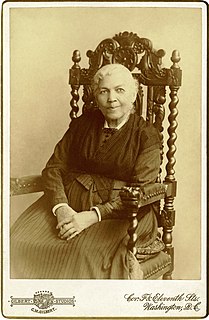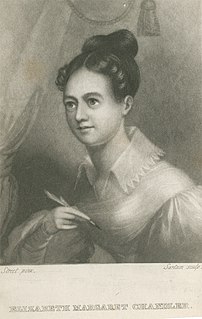A Quote by Harriet Ann Jacobs
Could you have seen that mother clinging to her child, when they fastened the irons upon his wrists; could you have heard her heart-rending groans, and seen her bloodshot eyes wander wildly from face to face, vainly pleading for mercy; could you have witnessed that scene as I saw it, you would exclaim, Slavery is damnable!
Related Quotes
She looked up at him and her face was pale and austere in the uplight and her eyes lost in their darkly shadowed hollows save only for the glint of them and he could see her throat move in the light and he saw in her face and in her figure something he'd not seen before and the name of that thing was sorrow.
If he looked into her face, he would see those haunted, loving eyes. The hauntedness would irritate him - the love would move him to fury. How dare she love him? Hadn't she any sense at all? What was he supposed to do about that? Return it? How? What could his calloused hands produce to make her smile? What of his knowledge of the world and of life could be useful to her? What could his heavy arms and befuddled brain accomplish that would earn him his own respect, that would in turn allow him to accept her love?
I took one glance at her in that hospital bed under the dull light and recognised the look on her face, which I'd seen on donors often enough before. It was like she was willing her eyes to see right inside herself, so she could patrol and marshal all the better the separate areas of pain in her body.
The good enough mother, owing to her deep empathy with her infant, reflects in her face his feelings; this is why he sees himselfin her face as if in a mirror and finds himself as he sees himself in her. The not good enough mother fails to reflect the infant's feelings in her face because she is too preoccupied with her own concerns, such as her worries over whether she is doing right by her child, her anxiety that she might fail him.
I saw a new world coming rapidly. More scientific, efficient, yes. More cures for the old sicknesses. Very good. But a harsh, cruel, world. And I saw a little girl, her eyes tightly closed, holding to her breast the old kind world, one that she knew in her heart could not remain, and she was holding it and pleading, never to let her go.
I looked and looked at her, and I knew, as clearly as I know that I will die, that I loved her more than anything I had ever seen or imagined on earth. She was only the dead-leaf echo of the nymphet from long ago - but I loved her, this Lolita, pale and polluted and big with another man's child. She could fade and wither - I didn't care. I would still go mad with tenderness at the mere sight of her face.
Drifting snowflakes brushed her face as light as lover’s kisses, and melted on her cheeks. At the center of the garden, beside the statue of the weeping woman that lay broken and half-buried on the ground, she turned her face up to the sky and closed her eyes. She could feel the snow on her lashes, taste it on her lips. It was the taste of Winterfell. The taste of innocence. The taste of dreams.
I think that one morning, the Papess woke in her tower, and her blankets were so warm, and the sun was so golden, she could not bear it. I think she woke, and dressed, and washed her face in cold water, and rubbed her shaven head. I think she walked among her sisters, and for the first time saw that they were so beautiful, and she loved them. I think she woke up one morning of all her mornings, and found that her heart was as white as a silkworm, and the sun was clear as glass on her brow, and she believed then that she could live, and hold peace in her hand like a pearl.
For a moment she turned in a circle, staring at her hands, which she held high and useless, close to her breast. She bobbed and shambled like an ape doing a trick, and her face was the silly, bewildered face of a joker's victim. And yet she could make no move that was not beautiful. Her trapped terror was more lovely than any joy that Molly had ever seen, and that was the most terrible thing about it.
I sit on the couch watching her arrange her long red hair before my bedroom mirror. she pulls her hair up and piles it on top of her head- she lets her eyes look at my eyes- then she drops her hair and lets it fall down in front of her face. we go to bed and I hold her speechlessly from the back my arm around her neck I touch her wrists and hands feel up to her elbows no further.
The mother gazes at the baby in her arms, and the baby gazes at his mother's face and finds himself therein... provided that the mother is really looking at the unique, small, helpless being and not projecting her own expectations, fears, and plans for the child. In that case, the child would find not himself in his mother's face, but rather the mother's own projections. This child would remain without a mirror, and for the rest of his life would be seeking this mirror in vain.





































